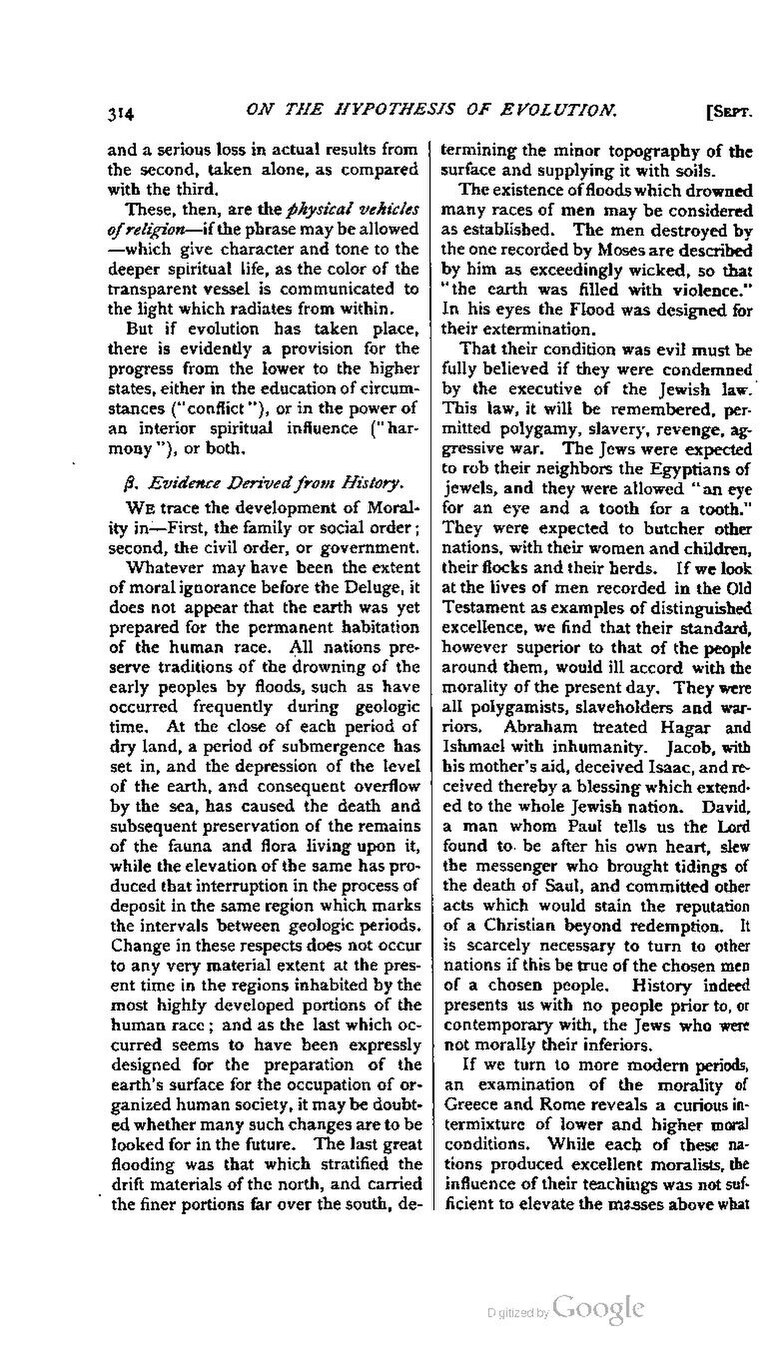and a serious loss in actual results from the second, taken alone, as compared with the third.
These, then, are the physical vehicles of religion—if the phrase may be allowed—which give character and tone to the deeper spiritual life, as the color of the transparent vessel is communicated to the light which radiates from within.
But if evolution has taken place, there is evidently a provision for the progress from the lower to the higher states, either in the education of circumstances ("conflict"), or in the power of an interior spiritual influence ("harmony "), or both.
β. Evidence Derived from History.
We trace the development of Morality in—First, the family or social order; second, the civil order, or government.
Whatever may have been the extent of moral ignorance before the Deluge, it does not appear that the earth was yet prepared for the permanent habitation of the human race. All nations preserve traditions of the drowning of the early peoples by floods, such as have occurred frequently during geologic time. At the close of each period of dry land, a period of submergence has set in, and the depression of the level of the earth, and consequent overflow by the sea, has caused the death and subsequent preservation of the remains of the fauna and flora living upon it, while the elevation of the same has produced that interruption in the process of deposit in the same region which marks the intervals between geologic periods. Change in these respects does not occur to any very material extent at the present time in the regions inhabited by the most highly developed portions of the human race; and as the last which occurred seems to have been expressly designed for the preparation of the earth's surface for the occupation of organized human society, it may be doubted whether many such changes are to be looked for in the future. The last great flooding was that which stratified the drift materials of the north, and carried the finer portions far over the south, determining the minor topography of the surface and supplying it with soils.
The existence of floods which drowned many races of men may be considered as established. The men destroyed by the one recorded by Moses are described by him as exceedingly wicked, so that "the earth was filled with violence." In his eyes the Flood was designed for their extermination.
That their condition was evil must be fully believed if they were condemned by the executive of the Jewish law. This law, it will be remembered, permitted polygamy, slavery, revenge, aggressive war. The Jews were expected to rob their neighbors the Egyptians of jewels, and they were allowed "an eye for an eye and a tooth for a tooth." They were expected to butcher other nations, with their women and children, their flocks and their herds. If we look at the lives of men recorded in the Old Testament as examples of distinguished excellence, we find that their standard, however superior to that of the people around them, would ill accord with the morality of the present day. They were all polygamists, slaveholders and warriors. Abraham treated Hagar and Ishmael with inhumanity. Jacob, with his mother's aid, deceived Isaac, and received thereby a blessing which extended to the whole Jewish nation. David, a man whom Paul tells us the Lord found to be after his own heart, slew the messenger who brought tidings of the death of Saul, and committed other acts which would stain the reputation of a Christian beyond redemption. It is scarcely necessary to turn to other nations if this be true of the chosen men of a chosen people. History indeed presents us with no people prior to, or contemporary with, the Jews who were not morally their inferiors.
If we turn to more modern periods, an examination of the morality of Greece and Rome reveals a curious intermixture of lower and higher moral conditions. While each of these nations produced excellent moralists, the influence of their teachings was not sufficient to elevate the masses above what
